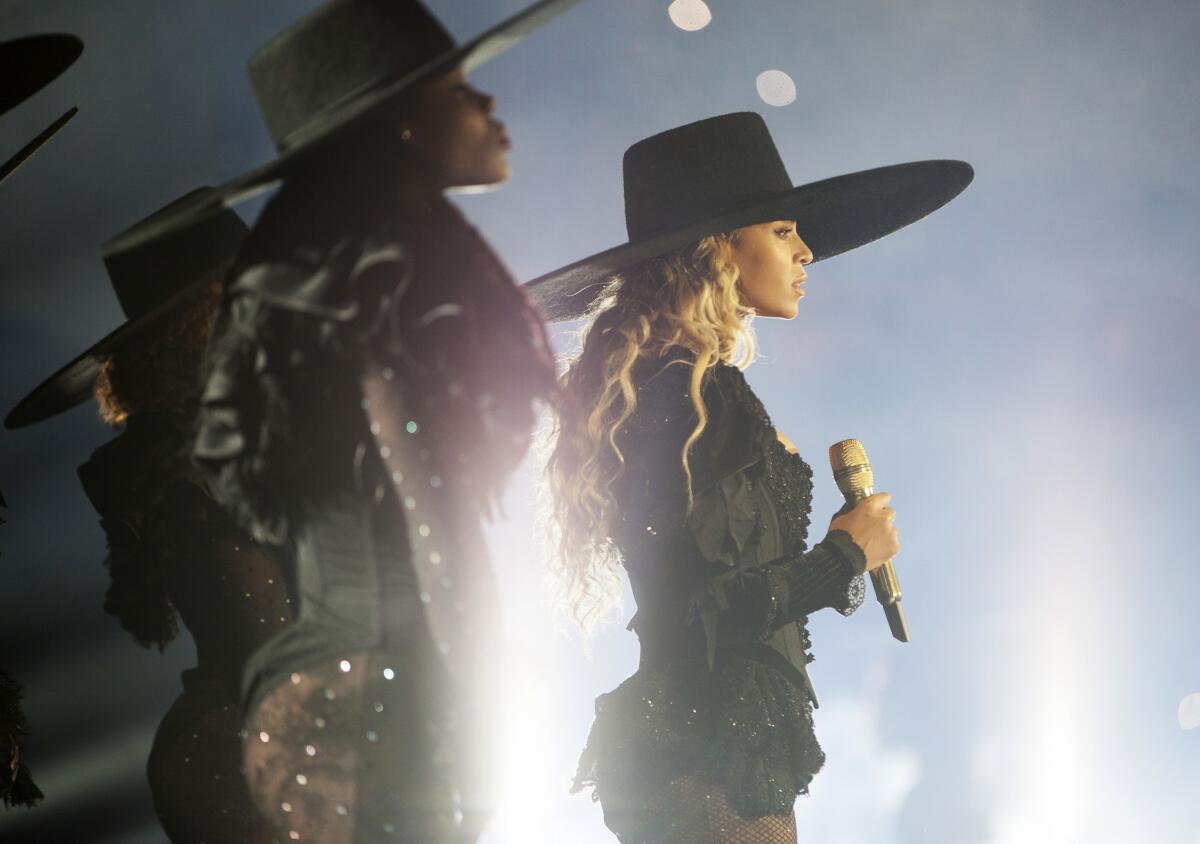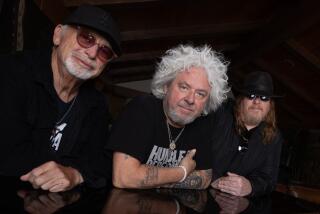Bigger than a breakup: Beyoncé and Radiohead conflate the personal and the political

- Share via
Last year Thom Yorke of Radiohead announced that he and his romantic partner, Rachel Owen, had separated after more than two decades together. So at first it seems pretty clear why this band finally put “True Love Waits,” a song it’s been playing since the mid-1990s, on one of its studio albums.
“Don’t leave,” Yorke pleads in the stark, moving piano ballad, which serves as the closing track on Radiohead’s just-released “A Moon Shaped Pool.” “I’m not living / I’m just killing time.” Keep listening, though, and a different, even more vivid lyric pops out of the song.
“Your tiny hands.”
On second thought, could it have been that newly relevant image — one that’s become linked with Donald Trump in this surreal election season — that really inspired Radiohead to pull “True Love Waits” from the archives?
It’s not the only instance in which Radiohead conflates the personal and the political in its latest work. And “A Moon Shaped Pool” isn’t the only current album to use the grammar of a breakup record to make broader arguments about culture, society and technology.
Most notably, there’s Beyoncé’s “Lemonade,” which begins as a diatribe against a cheating husband (evidently named Jay Z — who knew?) before expanding to address the injustices visited upon black women in America. There’s also “Hopelessness” by Anohni, whose purposely disturbing songs about climate change and drone warfare employ the sensual language and sleek electronic arrangements of modern pop.
RELATED: Where Beyonce, Black Lives Matter and global history collide: The ‘Black Power’ salute at West Point
“Broken hearts make it rain,” Yorke sings in Radiohead’s “Identikit,” and that certainly appears to be the case in a year flooded with high-profile breakup records, including more insular efforts from Drake and James Blake. But that rain falls differently into each artist’s life.
For Beyoncé, whose Formation World Tour is set to reach the Rose Bowl on Saturday for a sold-out concert, heartbreak provided something like an opportunity. Describing her marital troubles with “Lemonade” cuts like “Don’t Hurt Yourself” and “Sandcastles,” she disrupts the idealized vision of “Beyoncé” that’s taken hold in recent years; she encourages us to look at her as a person rather than a symbol.
Yet what’s so brilliant about the album is the way that newfound vulnerability makes powerful, message-minded songs such as “Freedom” and “Formation” feel more grounded — more lived — than they otherwise would have. Compare those tunes to “Run the World (Girls),” from Beyoncé’s 2011 album “4,” and the difference is clear: “Freedom,” about breaking chains and “cast[ing] away oppression” (as Kendrick Lamar puts it in his guest verse), positively throbs with human determination; “Run the World” sounds now like a corporate jingle.
Yorke gets a similar effect on “A Moon Shaped Pool,” which is full of self-flagellating songs that seem to refer to the end of his and Owen’s relationship. “Have you had enough of me?” he repeats several times in “Decks Dark,” while “Present Tense” has him worrying “that all this love could be in vain.”
As with Beyoncé, it’s initially a shock to hear such unguarded emotion from Yorke, who’s often been content to disguise his meaning with carefully drawn metaphors. But the singer’s confessional mode ends up deepening the impact of a tune like “Burn the Witch,” a “low-flying panic attack” (per Yorke’s memorable phrase) that moves beyond a breakup to embody anxieties about government surveillance and the refugee crisis in Europe.
Ditto Anohni, who narrates “Drone Bomb Me” from the perspective of a girl whose family has been killed in a mechanized attack from above.
“Explode my crystal guts,” she sings with all the drama (and the beauty) of someone bemoaning a figuratively wounded heart, “Lay my purple on the grass.”
The music asks a question: Shouldn’t these universal problems unsettle us as much as — if not more than — the individual experience of being dumped?
For most of us, of course, the honest reply is no. These artists’ accomplishment is that they make answering yes feel possible.
Twitter: @mikaelwood
ALSO
Here’s how many times Drake’s ‘Views’ was sold or streamed in its first week
How indie band Yacht duped us with their sex tape stunt
Passionate response to cracks that music legends are too old to rock Desert Trip mega-concert
More to Read
The biggest entertainment stories
Get our big stories about Hollywood, film, television, music, arts, culture and more right in your inbox as soon as they publish.
You may occasionally receive promotional content from the Los Angeles Times.










